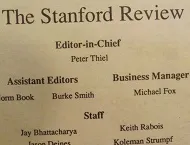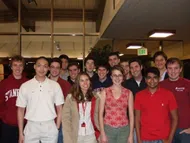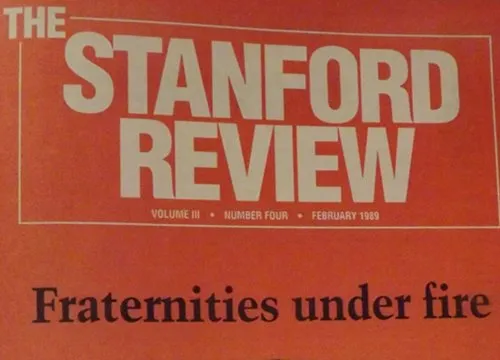Table of Contents
I have the honor of writing an editor’s note to commemorate 25 years of The Stanford Review. Truly capturing the heritage and impact of the paper’s storied history would be too great a task for this note. Yet I will try to commemorate the past and leave one note for the future.
The *Review *arose in the stormy hours of the late 1980s. Peter Thiel and Norman Book reacted, among other things, to a movement trying to relegate thousands of years of important knowledge to the dregs of history. Further embattled Review members took on the university when it tried to dilute constitutional rights through political correctness. Subsequent writers have investigated the ASSU, university governance, and liberal bias on campus. Last year the Review led the charge to bring back ROTC, and in the past few months the paper has served as a voice for critics of the Occupy movement.
One cannot be surprise to see that the Review has lasted for so long. One of the first articles written in the original issue, essentially a note from the editor, is called “The Stanford Review is Here to Stay.” This first editorial gives three motivations for the paper: to present alternative views, to create a forum for rational debate, and to engage with those who disagree with Review opinions. These purposes have inspired staff writers for a quarter century.
But an even more fundamental inspiration has come from the Review’s grounding in conservative and libertarian thought. This purpose underlines the paper’s efforts to provide a contrarian perspective on campus. When the Review calls for fiscal scrutiny and limited spending, when it critiques the nature of bureaucracy on campus, when it points out hyper-political correctness, and when it argues for traditional values, the Review draws upon its conservative credentials.
If anything, the future of The Stanford Review relies upon an embrace of conservatism. The student body requires a voice that opposes the self-centeredness of post-modernism and that limits the spread of corruption, hypocrisy, and inanity on campus. An adherence to conservative positions requires an adherence to liberty, order, and virtue.
The Review’s efforts have been successful because a select number of students have always seen the need to engage in a debate during their short time on campus. Many Stanford students will make decisions someday that count as the most influential of their time. The flame of thought that inspires those decisions is kindled during their time at Stanford, and the Review exists to nurture that flame with ideas of liberty. I trust that every year a group of students will arise and contribute to the maintenance of this future and the vibrance of the present.
It is without doubt: The Stanford Review is around to stay.
Kyle Huwa
Editor-in-Chief







